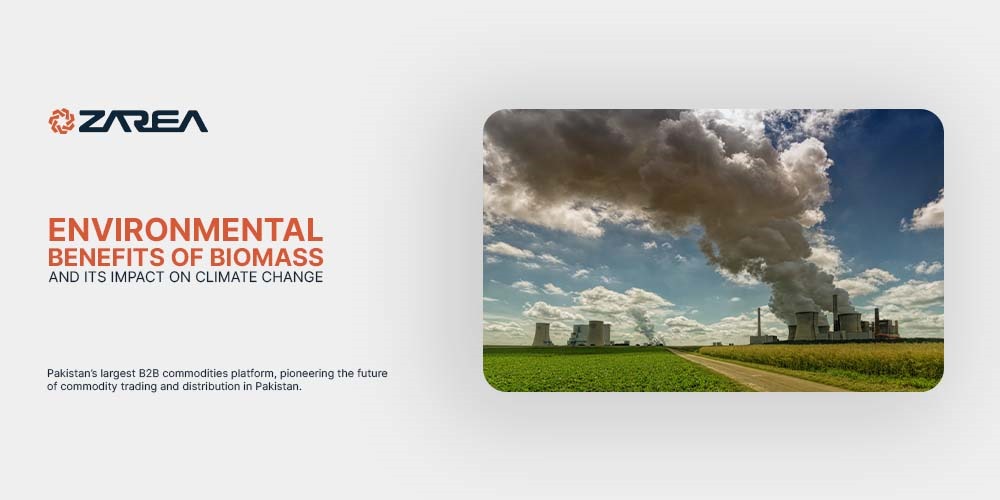Introduction – Biomass & Its Impact on Climate Change:
In the quest for cleaner and more sustainable energy options, biomass has emerged as an important renewable resource. Biomass energy, derived from organic materials such as agricultural waste, forestry residues, and animal waste, offers numerous environmental benefits. It acts as an effective alternative to fossil fuels and plays a key role in combating climate change. In this article Zarea explores the ecological advantages of biomass and its impact on international climate patterns.
Biomass serves as a renewable energy source:
One of the advantages of biomass energy is its sustainability, as it is an inexhaustible resource. Primarily originating from plants, biomass will remain accessible as a renewable energy source as long as plant life exists on Earth.
Biomass is a readily accessible source of energy:
Biomass acts as an easily obtainable energy source. It originates from multiple sectors, such as agriculture, forestry, fishing, aquaculture, algae, and waste products. Many energy experts agree that when assessing energy sources for their economic and environmental qualities, biomass is one of the most beneficial choices.
Advantages for the Environment:
Biomass energy aids in maintaining environmental cleanliness. With the ongoing growth of the world population, the amount of waste produced likewise escalates, requiring efficient disposal solutions. A large fraction of this waste pollutes water sources, negatively impacting ecosystems and threatening human health. Nonetheless, this waste can be utilized for generating energy, biofertilizers, and other useful products
Understanding Biomass Energy:
Biomass is defined as organic material utilized as an energy source. Typical sources encompass:
- Agricultural Residues: Remnants from crops, sugarcane bagasse, and peels from fruits.
- Forestry Byproducts: Sawdust, wood chips, and bark generated by the lumber industry.
- Animal Waste: Manure from livestock that is transformed into biogas.
- Municipal Organic Waste: Organic materials that are processed into biofuels.
Environmental Benefits of Biomass:
Decrease in Greenhouse Gas Emissions:
- Biomass generates considerably lower amounts of carbon dioxide (CO₂) compared to fossil fuels.
- Sustainable biomass practices ensure that the CO₂ released during combustion is reabsorbed through the growth of new vegetation, creating a carbon-neutral cycle.
- Biomethane produced from animal waste traps methane, a potent greenhouse gas, thus stopping its emission into the atmosphere.
Waste Management and Recycling:
Converting organic waste into energy aids in reducing the amount of waste in landfills. The efficient use of agricultural and forestry waste minimizes the requirement for open burning, consequently reducing air pollution.
Reduction in Air Pollution:
Unlike coal and diesel, biomass energy produces considerably reduced levels of sulfur dioxide (SO₂) and nitrogen oxides (NOₓ), aiding in the reduction of acid rain and smog creation. Utilizing biofuels in the transport sector reduces particulate matter emissions, thus improving air quality.
Soil Health and Sustainable Land Use:
Byproducts from biomass processing can act as organic fertilizers, thus enhancing soil fertility. The eco-friendly production of biomass enhances agroforestry methods, promoting greater biodiversity and helping to curb land degradation.
Biomass and Its Role in Climate Change Mitigation:
Carbon Neutrality and Climate Stability:
Biomass absorbs carbon dioxide (CO₂) while plants develop, thus counterbalancing the emissions generated during burning. The method of carbon capture through sustainable forestry and farming practices aids in reducing global carbon emissions.
Substitution for Fossil Fuels:
Biomass serves as a renewable alternative to coal, oil, and natural gas. Using biomass for producing electricity, heating, and transport reduces dependence on fossil fuels and decreases carbon footprints.
Climate-Resilient Energy Source:
The generation of biomass energy shows more resilience to severe weather conditions in comparison to solar and wind energy sources. Decentralized biomass energy systems provide reliable electricity in rural areas and locations at risk of disasters.
Challenges and Solutions in Biomass Utilization:
Land Use Issues:
The large-scale generation of biomass could lead to deforestation and conflicts regarding land use.
Suggested Approach: Promote the utilization of renewable biomass resources, such as agroforestry methods and biomass obtained from waste products.
Energy Efficiency and Processing Expenses:
Biomass conversion technologies require considerable initial financial outlays.
Suggested Approach: Improvements in biofuel processing techniques, coupled with governmental support, can boost both efficiency and affordability.
Awareness and Policy Support:
Many areas lack policies that promote the advancement of biomass energy.
Suggested Approach: Governments should create incentives, offer subsidies, and launch research initiatives to promote the development of biomass energy.
Final Thoughts:
Biomass energy provides a practical solution for tackling environmental problems and climate change. Its ability to reduce greenhouse gas emissions, efficiently handle waste, and promote sustainable land practices makes it a vital component in the worldwide transition to renewable energy. Through the adoption of responsible biomass methods and the integration of innovative technologies, we can maximize its capacity to combat climate change and create a cleaner, more sustainable future.
FAQ’s:
What are the environmental benefits of biomass energy?
Biomass energy can greatly reduce greenhouse gas emissions. When biomass is incinerated, it releases a comparable amount of carbon dioxide as fossil fuels. Nevertheless, fossil fuels emit carbon dioxide that was captured during photosynthesis millions of years in the past, effectively making it a practically “new” greenhouse gas.
What is the environmental impact of biomass?
Biochemical techniques for converting biomass into fuel produce air contaminants, solid waste, and wastewater, which may negatively impact the environment. The thermochemical transformation of biomass into fuels leads to the release of air pollutants, including particulates, carbon monoxide, hydrogen sulfide, and polycyclic organic compounds.
Is biomass environmentally friendly?
The use of biomass and biofuels obtained from biomass offers both benefits and drawbacks for the environment. One major benefit is that these sources act as substitutes for fossil fuels. The burning of fossil fuels and biomass releases carbon dioxide (CO2), a greenhouse gas.
Why is biomass important in an ecosystem?
Biomass signifies the distribution of energy and resources within a community. As it grows, plant biomass absorbs carbon dioxide and emits it when combusted, thereby aiding in the recycling of atmospheric carbon.
Is biomass a clean resource?
Biomass acts as a renewable and clean energy source, obtaining its primary energy from sunlight. Both plant and algal biomass can renew in a fairly short time. Resources like trees, crops, and municipal solid waste are easily available and can be managed sustainably.
































